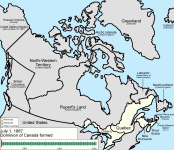- Joined
- Sep 30, 2019
- Messages
- 28,679
- Reaction score
- 33,644
- Gender
- Male
- Political Leaning
- Liberal
Of course it's possible legally to change our government structure to eliminate the monarchy. The hitch: everyone has to agree to it. Parliament including the Senate, the Provinces including Quebec, and Indigenous groups (who are very much loyalists), all need to sign up.
The government, whether it be Conservative or Liberal, has no incentive to make this kind of change. Under the current system the federal government has unfettered legislative power whilst still being able to point to guardrails in place (the Senate, Governor General, Supreme Court) to prevent irresponsible governance.
There are two other impediments to this when it comes to government reticence in making changes in my opinion. The first is that any change would invite a power-grab from the provinces. As soon as you open the Constitutional can of worms the provinces would demand changes to their share of the pie. The other impediment is our southern neighbour as a cautionary tale. Competing legislative power centers don't work very well in practice. If the Senate or our Head of State were ever to become politicized we might see the same level of disfunction Americans face.
Rest of the opinion piece
So you want to get rid of the monarchy in Canada?
Legal and constitutional experts agree: It’s practically impossible.
The Canadian constitution sets a very high bar for making fundamental changes to the monarchy, including abolishing it: the House of Commons, the Senate, and all 10 provincial legislatures must agree.
“Given just the sheer complexity of actually achieving the total unanimity of the provinces plus the federal Parliament, which includes the Senate, just on that technical basis it is impossible,” said University of Ottawa law Prof. Errol Mendes.
There’s also been a reluctance over the last few decades for federal governments to deal with “fundamental constitutional change,” said Andrew McDougall, professor of Canadian politics and public law at the University of Toronto.
“There’s been this long-standing taboo around mega constitutional change because there’s the sense that if you start on some of these issues, then you start bringing in everything else, and that can be really quite risky,” he said.
“It can trigger a national unity debate. It could reopen Quebec’s place in the country. There would be a whole bunch of other issues that would come up.
The government, whether it be Conservative or Liberal, has no incentive to make this kind of change. Under the current system the federal government has unfettered legislative power whilst still being able to point to guardrails in place (the Senate, Governor General, Supreme Court) to prevent irresponsible governance.
There are two other impediments to this when it comes to government reticence in making changes in my opinion. The first is that any change would invite a power-grab from the provinces. As soon as you open the Constitutional can of worms the provinces would demand changes to their share of the pie. The other impediment is our southern neighbour as a cautionary tale. Competing legislative power centers don't work very well in practice. If the Senate or our Head of State were ever to become politicized we might see the same level of disfunction Americans face.
Rest of the opinion piece

